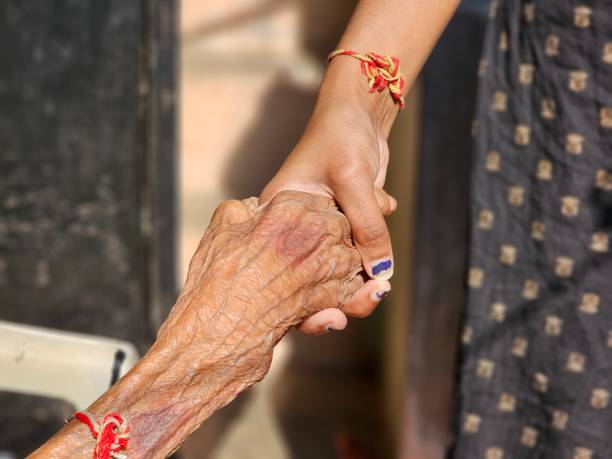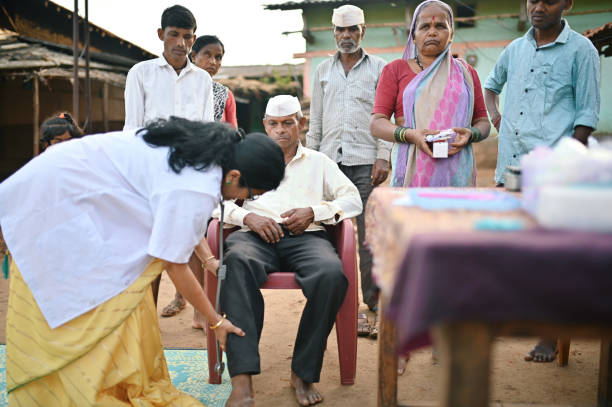How an Indian NGO Supports Elderly Care Properties
These teams work across the clock to supply meals, medical care, emotional help and the consolation of a neighborhood. On this piece, we are going to study How an Indian NGO Supports Elderly Care Homes in actual examples, actionable perception, and a concrete understanding how their work transforms individuals.
Why Elderly Care Properties are Vital in India
India is house to one of many largest aged populations on the planet. Greater than 300 million individuals in India will likely be over 60 by 2050, stories point out. This generates an monumental want for well being care, help in occasions of trauma and housing.
Properties for the aged will help fill this void. They supply shelter, meals, medical remedy and a pleasant setting for older individuals.
However to run such houses is way from simple. It requires cash, a educated workers, medical services and social applications to maintain residents joyful and wholesome. That’s why NGOs are such an enormous position participant. They use fundraising, consciousness campaigns and volunteer applications to maintain them and get them rising. How an Indian NGO Supports Elderly Care Properties The reciprocal comprehension permits us to worth the act behind each smile on an previous face.
How an Indian NGO Supports Elderly Care Properties: A Step-by-Step Look
Let’s deconstruct it How an Indian NGO Supports Elderly Care Properties in a sensible:
1. Constructing Protected and Clear Services
Quite a few houses for the aged in India start on a small scale, generally in rented premises. NGOs do their half by financing higher buildings with clear rooms, medical wards and kitchens.
For instance:
HelpAge India constructs new houses which can be wheelchair accessible, has clear consuming water, and correct cooking services.
One other N.G.O., the Little Sisters of the Poor, additionally concentrates on constructing houses with gardens and prayer rooms for religious consolation.
Its secure services that guarantee individuals stay with dignity, not merely in shelters.

2. Offering Healthcare Companies
It’s regular for previous age to deliver well being points, resembling diabetes, coronary heart illness or mobility points. NGOs usually collaborate with hospitals to facilitate month-to-month well being checkups.
- Agewell Basis is organising month-to-month go to of docs to aged care houses.
- HelpAge India operates cellular healthcare vans for remoted villages.
- This gives early detection of well being points and decrease hospital prices in your neighborhood.
3. Providing Emotional Help and Companionship
Seniors are struggling in silence from loneliness. A few of them go for months with out household visits. Volunteers from nongovernmental organizations go to the youngsters, learn them books and have a good time their birthdays and maintain festivals.
For instance:
Reminiscence Cafés, the place older individuals with dementia can socialize with educated volunteers, are the work of Dignity Basis.
The Silver Innings Basis arranges cultural programmes and storytelling classes for the inmates.
Studying How an Indian NGO Supports Elderly Care Properties emotionally demonstrates to us that psychological health issues as a lot as bodily well being.
4. Ability Coaching for Caretakers
Workers educated Working a contact automobiles, houses for-care house. Workshops for guardians NGOs supply workshops in guardians relating to:
- Elderly diet
- First help coaching
- Dementia and Alzheimer’s care
- Psychological well being help
- Palliative care
Teams just like the Dignity Basis supply coaching programs for workers to allow them to ship more practical care. Some NGOs additionally present formal certificates accredited by the federal government for the caregivers, additionally leading to higher alternatives for employment within the eldercare space.
5. Monetary Assist for Day by day Wants
Meals, drugs, and electrical energy payments had been costly as was repairs. NGOs elevate cash via:
- Charity occasions
- Go for crowd funding platforms resembling Ketto or Milaap
- Company CSR partnerships
- Authorities welfare schemes
This retains all the pieces working and residents don’t need to take care of shortages.
6. Authorized and Pension Help
There are various aged, who’re having problem claiming pensions or addressing authorized land points. NGOs have additionally organized authorized help camps in care houses to allow the aged to entry authorities advantages and resolve disputes.
As an illustration:
Agewell Basis has authorized helpline for senior residents.
Nightangle Medical Belief additionally advises on ‘medical health insurance and pension papers.
Actual-Life Implementations: The Energy of Indian NGOs
To get a way of How an Indian NGO Supports Elderly Care Properties, let’s contemplate a couple of actual names:
- HelpAge India: Affords medical vans, cataract surgical procedures and old-age houses all through India.
- Agewell Basis: Emotional wellbeing and counseling of the aged.
- Dignity Basis: Offers day-care centres, dementia care and senior helplines.
- Nightangle Medical Belief: Acknowledged for its “Elder Helpline” and low-cost previous age houses.
- Silver Innings Basis: Organises senior-friendly occasions and raises consciousness relating to elder rights.
Every of those NGOs presents a distinct facet of what they do for our aged care houses, whether or not healthcare, emotional care, or authorized illustration.
How an Indian NGO Supports Elderly Care Properties By way of Know-how
At the moment’s NGOs additionally apply know-how to supply higher take care of the aged:
- Apps on telephones monitor drugs timings and food plan timings.
- Telemedicine providers deliver seniors on-line to seek the advice of with docs in mere minutes.
- The case for putting in CCTV cameras in care houses.
- Video calling rooms make it simple for households to speak with their family members.
- Wearable well being devices observe coronary heart charges and blood strain for aged individuals with power illnesses.
- A digital strategy shows How an Indian NGO Supports Elderly Care Properties in novel methods.
Obstacles Encountered by NGOs in Caring for the Elderly
As we study How an Indian NGO Supports Elderly Care Properties, we should additionally study from their struggles:
- Brief on funds: Most care houses are usually not commonly supported with donations.
- Workers burnout: You must have endurance, you need to understand how to do that. Low pay can also be among the many high causes that many workers name it quits.
- Well being emergencies: Speedy want of funds or extremely skilled docs in case of medical emergence.
- Authorities approvals: Licenses and grants paperwork slows tasks down.
- Stigma: There are households that may nonetheless hesitate to ship an elder to a care house which restricts the attain of NGOs too.
Regardless of such troubles, NGOs maintain plowing on, demonstrating experience and reliability.
Why Public Help Issues
Plenty of people have requested what they will do. Something in any respect — donations, volunteering, sharing info — to assist the NGOs is critical proper now.
Right here’s what the general public can do to assist:
- Make a month-to-month donation to sponsor a meal or medical checkup.
- Volunteering time to share tales, educate a passion, or host occasions.
- Share NGO social posts to make them seen.
- Company to be urged to undertake care houses as part of Goti Dandi Charitable Exercise.
“When you recognize How an Indian NGO Supports Elderly Care Properties you recognize that you just don’t need to be huge to do huge issues.
Way forward for Outdated Age Properties in India
Higher well being know-how, elevated consciousness and extra educated caregivers have helped and the outlook appears good. Most aged care houses in India would in a decade: Specialists estimate that inside a decade, most aged care houses in India would:
- Telemedicine rooms
- Physiotherapy facilities
- Dementia-friendly services
- 24/7 emergency response techniques
- On-site nutritionists and psychological well being counselors
- NGOs will proceed to be on the entrance strains of this transformation as a result of they match expertise to caring ardour.
Different Methods Nonprofits are altering the Recreation in Elder Care
Along with the above types of help, many NGOs are at this time:
- Establishing senior golf equipment for socialization.
- Kickstarting consciousness campaigns about psychological well being considerations in later years.
- Tie-up with corporates on CSR tasks to get funding.
- Offering dietary plans with dieticians to enhance the well being of the aged.
- Establishing respite care facilities for households who require short-term take care of elders.
These are efforts that display the position of NGOs goes properly past shelter—they’re working to present seniors a lifetime of dignity and pleasure.

Conclusion
Let’s stroll via How an Indian NGO Supports Elderly Care Properties step-by-step, on this article. From making houses secure, to offering medical care, emotional consolation, authorized help and coaching for care-givers, their work impacts each space of an previous individual’s life.
Organizations resembling HelpAge India and Agewell Basis in actual life show that with public help, these houses will help seniors with a lifetime of dignity and contentment.
In supporting these NGOs, we’re supporting our future though some day, there will likely be care required for all households for his or her elders.
FAQs
How can I contribute to NGOs supporting old-age houses in India?
You’ll be able to go the official web sites of NGOs resembling HelpAge India or Dignity Basis. The bulk embrace safe donation hyperlinks and details about tax benefits.
Is there a means I can volunteer at an aged care house?
Sure. A lot of them have alternatives for volunteers to spend time with older individuals, organize actions, elevate funds and extra.
Will my donation to an aged care ngo be tax exempted?
Nearly all registered NGOs present 80G certificates and you may declare tax deduction on the donations you made to them.
Do NGOs attend to emergency take care of aged residents?
Sure, there are various previous age houses that are being run by NGOs which have tie-ups with hospitals for instant care throughout emergencies.
How can corporates assist Indian previous age houses?
4) Corporates can come ahead via their CSR tasks to help previous age houses within the type of offering funds, medical aids or by giving technical help to previous age houses.
